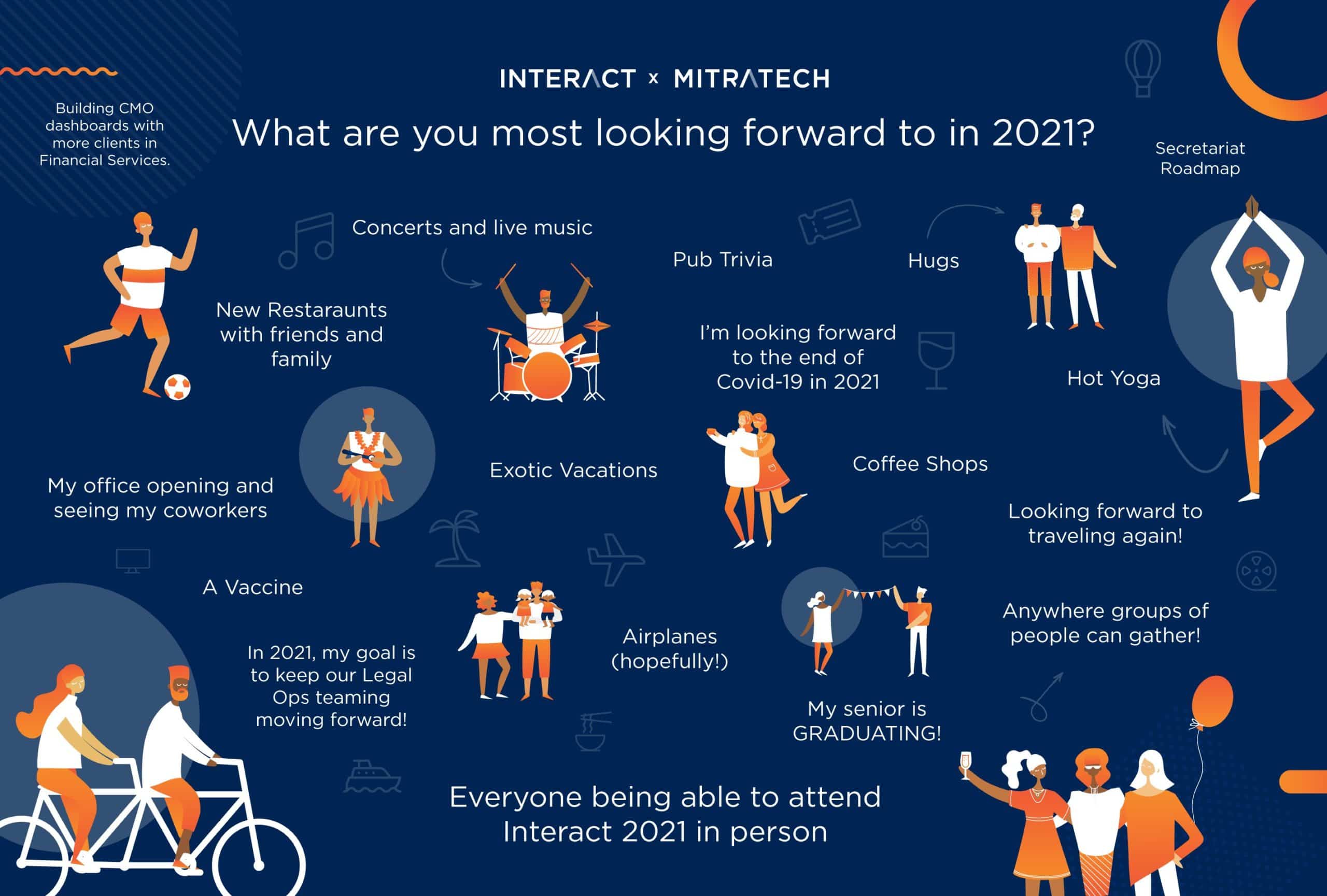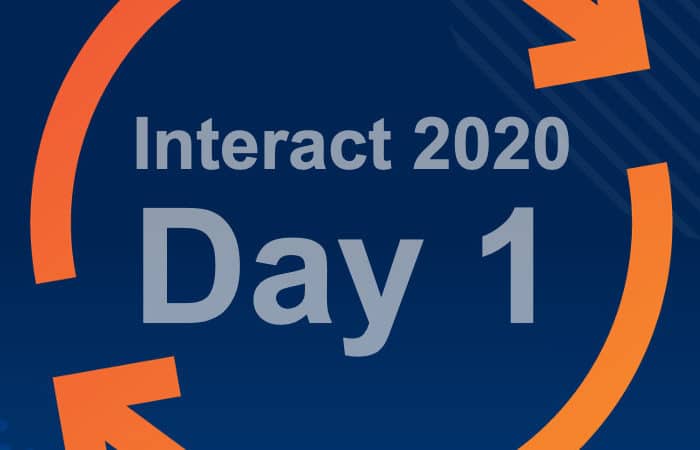Live From Interact 2020, Day One: Legal Looks Forward
2020 has been a year of unexpected developments. But also of people rising to the challenge. The very nature of this year’s Interact brings that home.
Last year, the Mitratech user community assembled for our annual user conference in Austin, as it has for previous Interacts. As big and extensive and energized as that event was, our events team (and for that matter, our attendees) had the benefit of hindsight and experience in pulling it off.
This year? Not so much. Because current events dictated we had to swap horses in midstream – a tactic Abe Lincoln himself would have advised against – when it came to staging Interact 2020.
Transforming disruption into evolution
Interact 2020’s first day was devoted to Legal Operations, and it was fitting to lead with them, since the theme of the conference was The Community Driving Business Continuity. The coronovirus upended business-as-usual for everyone, and the very survival of many organizations was at stake. Legal operations departments were uniquely equipped to act as change agents who could squarely meet those challenges and take the steps necessary to keep legal departments, their legal services networks, and the organization around them on track.
As Mitratech CEO Mike Williams pointed out in his Day One keynote, Legal as a Source of Innovation and Excellence:
No one could have predicted the unprecedented circumstances we are dealing with this year. You’re in a unique seat to lead your organizations in Legal, Risk, and Compliance. Legal is a pioneer in managing this change and mitigating risk.
But our user community is looking beyond the future of their businesses. We asked them to share what they’d like to see happen in 2021, and their hopes are probably shared by nearly everybody.

A highlight of the keynote session came when Mike was joined by George Grawe, Senior VP/Deputy General Counsel at Allstate, who’s been advancing the modernization of legal processes and practices for over 30 years. One thing he realized early in his career there?
It was easy to take out the dictaphone, and it was easy for a lawyer to generate a lot of work for the support staff. I wanted to do something to enable the staff to be happier in their work and complete the tasks that I had given them. Technology was part of the answer…When we decided that we wanted to use technology to drive the changes we wanted, that led us to Mitratech.
Getting others to embrace change can be difficult, even during times like these when it’s more urgent than ever. One approach he recommends?
(People) will say they have a more efficient way to do things…you need to get in the trenches with folks to see how they do their job. If you can find a way to have the technology complement the way they do their work, they become your change champions.
It is Time We Got This Right: Legal and Law Firm Diversity
It’s an enormously hot topic for a session we previewed recently, as Victoria Hudgins of Legaltech News sat down with David Cunningham of Legal Metrics and Winston & Strawn, and Nagendra Donepudi, Mitratech’s SVP of Product Development.
“Diversity is really driving buying decisions,” David explained, as more clients mandate that law firms display inclusion and diversity in the teams working on their business. Those clients “want people to feel like everybody has an opportunity,” and that sentiment is shared by many firms as well, he says:
I thought the legal departments would have to compel law firms to participate (in diversity), but I’ve found equally good reception from both sides.
As for the technology that corporate legal departments are asking for to support diversity efforts, they’re not looking for standalone products but features to enhance existing ones. As Nagendra pointed out, “What we have seen in the past several years is, (users) want something that integrates within a system they’re already using.”
TIK-TAPpening: Co-Innovation on Display
Justin Hectus, CIO/CISO at Keesal, Young & Logan and CIO of Keesal Propulsion Labs and Mitratech’s Brian McGovern, General Manager, Workflow Solutions are well-paired presenters, as anyone who’s seen them in action before can say.
One example of co-innovation they shared: KP Labs designed and built a workflow for a NetApp use case in a 24-hour hackathon. The result impressed Connie Brenton, Chief of Staff and Senior Director of Legal Operations at NetApp enough for her to say, “In 24 hours, you’ve delivered a fundamentally different and better way to communicate our expectations and obtain commitments from our outside counsel.”
A well-designed, flexible workflow, using the right solution, can accomplish more than just accelerate a task from start to finish. “If you do this right, you build in policy, procedure, and training in the workflow,” Justin said.
Co-innovation between provider and client, and even between Legal Ops professionals at different organizations, is the mainspring behind these successes. Referring to TAP’s own Co-Innovation Center, Brian said, “There’s a whole bunch of ideas there that give you a huge leg up on what to do next.”
“It’s an alarmingly open community,” Justin said. “It’s all built around this idea of possibility that comes out of TAP.”
IDC State of the Legal Ops Industry
Ryan O’Leary, Senior Research Analyst, Legal, Risk, & Compliance at IDC, presented his analysis of current disruption in the marketplace, shifting buyer priorities, and trends among corporations evaluating legal technology. The findings he shared were eye-opening.
Ryan noted that although we’re in an incredibly disruptive period right now, he expects strong investment in legal technology to continue because it’s so central to efforts around business resiliency, which has become the top priority for the C-suite. Prior to COVID, Digital Trust Programs and Infrastructure projects were top of mind, but the move into a work-from-home environment flipped priorities to just keeping the lights on by ensuring resilient business operations and solid customer experiences. Ryan further explained that business resiliency is bigger than continuity because it’s about planning for the next disruption versus just looking at current risk.
Because Legal Operations are so critical to the organization, Ryan said that the current crisis has presented a real opportunity for those that work in that role. “Legal’s budget seems to be safe or even growing during the pandemic, so now is not a time to rest on your laurels. With the shift to business resiliency as a focus, legal tech can help you do your job more effectively.”
Legal takes center stage: 83% of organizations say the General Counsel or Chief Legal Officer is central to business operations.
And by demonstrating business value, legal departments have opened the eyes of rest of the organization. According to IDC, 83% of organizations say the General Counsel or Chief Legal Officer is central to business operations providing a platform for legal to demonstrate value for their organizations by improving efficiency and collaboration to manage compliance and reduce risk.
Major enterprises are investing in legal tech as part of an overall digital transformation strategy. Beyond that primary strategic driver, improving team efficiency, keeping up with business demand and growth and the desire to improve security were all forces shaping this rise in investment. For enterprise legal management, ease of use, advanced analytics and AI and data encryption/governance were noted as the most important functionalities. Ryan advised that organizations not leveraging automation and analytics to take away manual uplift were “leaving dollars on the table.”
As for looking into the future? Ryan noted the rising importance of legal service delivery, is currently a big pain point in many organizations who will be looking to address it down the road. He also pointed to the rise of Slack and similar tools that represent new areas of potential employee risk that Legal will need to examine closely. Overall, the future of legal operations and technology is bright; the current focus on business resiliency is only accelerating its broad adoption.
Protecting Your Most Important Assets, Your People!
Julie Pearl, former Chair and Co-founder of Tracker Corp and CEO of Pearl Law Group was joined by William Stock, a founding member and Partner at Klasko Immigration Law Partners, LLP and Marketa Lindt, Partner at Sidley Austin LLP.
They’re three of the foremost immigration and employment attorneys in the country, and they ranged across a wide variety of topics and issues related to the pandemic and how work-from-home has impacted immigration law. “These are questions that if you didn’t have to answer them before, now you’ll certainly have to answer them,” William Stock said.
For instance, the new mobility allowed by work-from-home roles means an employee can change locations with ease. But what are the reporting requirements for employers if those employees are on visa? And as ICE and USCIS requirements toughen, with more ICE audits and potential fines looming, “one thing that we’re seeing across the board…they’ve (foreign national employees) have never been more anxious than they are now,” explained Marketa Lindt.
The Community Driving Business Continuity
The final session of the day brought together James Wiseman, VP, Client Operations at Mitratech, LaToya Smith Griffin, Senior Manager, Legal Operations and Business Analytics at Home Depot, George Chiu, Director, Systems Development at Prudential Financial, and Jeff Marple, Innovation Director – Corporate Legal, Liberty Mutual Insurance.
They addressed a wide selection of issues impacting the insurance industry in the COVID-19 era, especially when it came to remote workforces. “I wonder if working remotely is the new norm,” George Chiu said. “I don’t see a drop in productivity from the company perspective. The uncertainty of going back to the office might not be uncertainty. We might be able to spend more time working remotely. I would be very surprised if everyone was forced to return to the office.”
For him, “The most challenging thing during this period hasn’t been the technology…it’s the maintaining of work-life balance. I’m 100% home at the computer, so I could just keep working and working.”
At Home Depot, the use and focus of legal technology hasn’t been that affected by the pandemic, LaToya said. “I don’t think that our requirements from [COVID-19] are any different. Our goals are always about using tech to become more efficient,” and to move away from paper and cut costs. As for the technologies being used, she gave a shout-out to Mitratech: “What worked in the office just happens to work perfectly at home.”
But as Jeff Marple added, current circumstances are bound to drive change in the legal industry. “If there has ever been a greater catalyst for digital transformation in the law, I don’t know what it is!”
What worked in the office just happens to work perfectly at home.
LaToya Smith Griffin
Home Depot
Watch Every Day of Interact EMEA 2021 On Demand
View every recorded session, featuring legal, risk & compliance pundits, for free!


